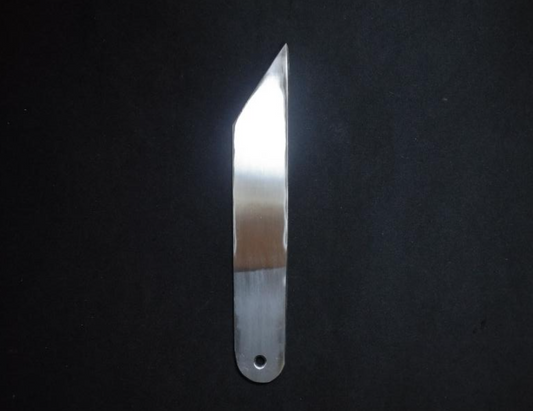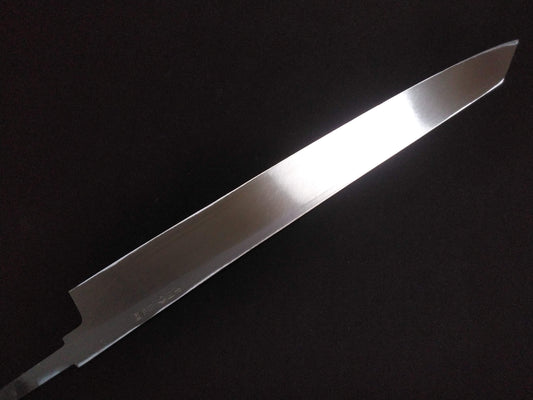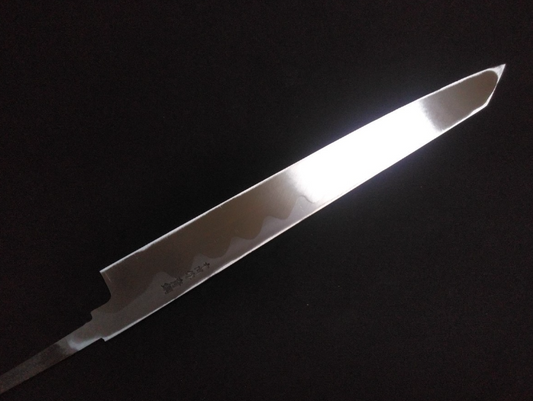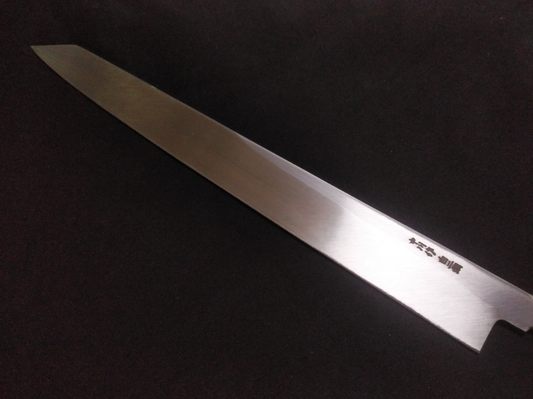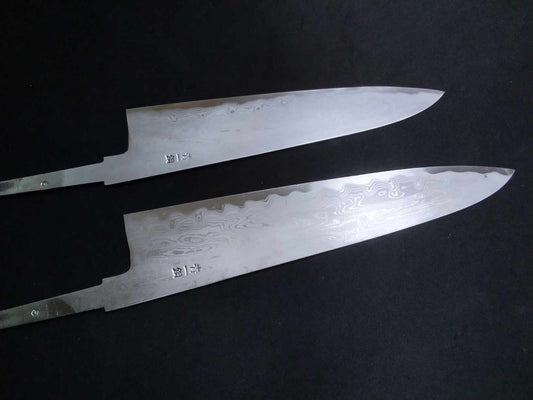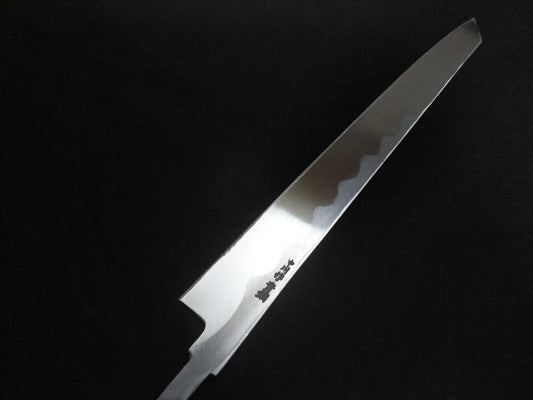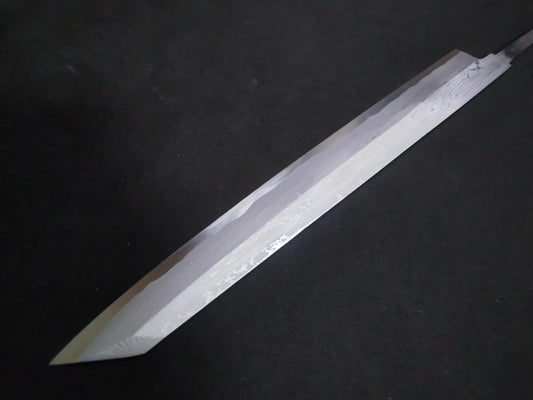
Satoshi Nakagawa
-
In Sakai, where 600 years of knife-making tradition live on, a young master is forging the future.
Satoshi Nakagawa, the youngest Traditional Craftsman in history, blends the wisdom of his mentor Kenichi Shiraki with his own vision for innovation. Every blade he creates reflects the harmony of tradition and progress—a perfect balance of precision, beauty, and soul.
-
Sakai Traditional Craftsman Collection: Satoshi Nakagawa
-
White Steel #2 Eel Knife 186mm
Regular price $250.00 CADRegular priceUnit price / per$0.00 CADSale price $250.00 CAD -
White Steel #2 Yanagiba 300mm-Mirror Polished(one side)
Regular price $434.00 CADRegular priceUnit price / per$0.00 CADSale price $434.00 CAD -
White Steel #2 Yanagiba (Kiritsuke) 300mm-Mirror Polished(one side)
Regular price $469.00 CADRegular priceUnit price / per$0.00 CADSale price $469.00 CAD -
White Steel #2 Yanagiba 330mm-Mirror Polished(one side)
Regular price $500.00 CADRegular priceUnit price / per$0.00 CADSale price $500.00 CAD -
Blue Steel #2 Yanagiba(Kiritsuke) 270mm-Mirror Polished(one side)
Regular price $517.00 CADRegular priceUnit price / per$0.00 CADSale price $517.00 CADSold out -
White Steel #2 Yanagiba (Kiritsuke) 330mm-Mirror Polished(one side)
Regular price $530.00 CADRegular priceUnit price / per$0.00 CADSale price $530.00 CAD -
Blue Steel #1 Damascus Gyuto 210mm- Mirror Polished Blur Finish
Regular price $584.00 CADRegular priceUnit price / per -
Blue Steel #2 Yanagiba(Kiritsuke) 330mm-Mirror Polished(one side)
Regular price $600.00 CADRegular priceUnit price / per$0.00 CADSale price $600.00 CADSold out -
Blue Steel #1 Damascus Gyuto 240mm- Mirror Polished Blur Finish
Regular price From $631.00 CADRegular priceUnit price / per -
Blue Steel #1 Damascus Yanagiba(Kiritsuke) 300mm- Mirror Polished Blur Finish
Regular price $850.00 CADRegular priceUnit price / per -
White Steel #2 (Honyaki-Mizuyaki) Yanagiba 300mm-Mirror Polished(one side)
Regular price $1,600.00 CADRegular priceUnit price / per$1,600.00 CADSale price $1,600.00 CADSold out -
White Steel #2 (Honyaki-Mizuyaki) Yanagiba 330mm-Mirror Polished(one side)
Regular price $1,900.00 CADRegular priceUnit price / per$1,900.00 CADSale price $1,900.00 CADSold out
Satoshi Nakagawa: The Youngest Traditional Craftsman in History
-

A Remarkable Achievement at 30
In 2023, Satoshi Nakagawa became the youngest certified Traditional Craftsman (Dentō Kōgeishi) in Sakai’s centuries-old knife-making history. After 16 years of rigorous apprenticeship under the legendary Kenichi Shiraki, Nakagawa has earned a reputation for combining speed, precision, and artistry in every blade he creates.
-
Mastery Across Steels
From White and Blue carbon steels to innovative patterns like Enmon Bokuryu and Genbu Bokuryu, and advanced techniques such as Mizumoto-yaki, Nakagawa’s expertise spans both traditional and modern approaches. His creations embody strength, elegance, and flawless performance.
-
A Vision for the Future
Nakagawa is not only preserving Sakai’s 600-year legacy—he is shaping its future. Trusted by top Japanese and Western chefs, he aims to elevate Japanese knife-making on the global stage through innovation grounded in tradition.
KIREAJI's Three Promises to You
-

1. Forged in the Legacy of Sakai
From Sakai City—Japan’s renowned birthplace of professional kitchen knives—each blade is crafted by master artisans with over six centuries of tradition. Perfectly balanced, enduringly sharp, and exquisitely finished, every cut carries the soul of true craftsmanship.
-

2. Thoughtful Care for Everyday Use
Every knife includes a hand-fitted magnolia saya for safe storage. Upon request, we offer a complimentary Honbazuke final hand sharpening—giving you a precise, ready-to-use edge from day one.
-

3. A Partnership for a Lifetime
A KIREAJI knife is more than a tool—it is a lifelong companion. With our bespoke paid aftercare services, we preserve its edge and beauty, ensuring it remains as precise and dependable as the day it first met your hand.
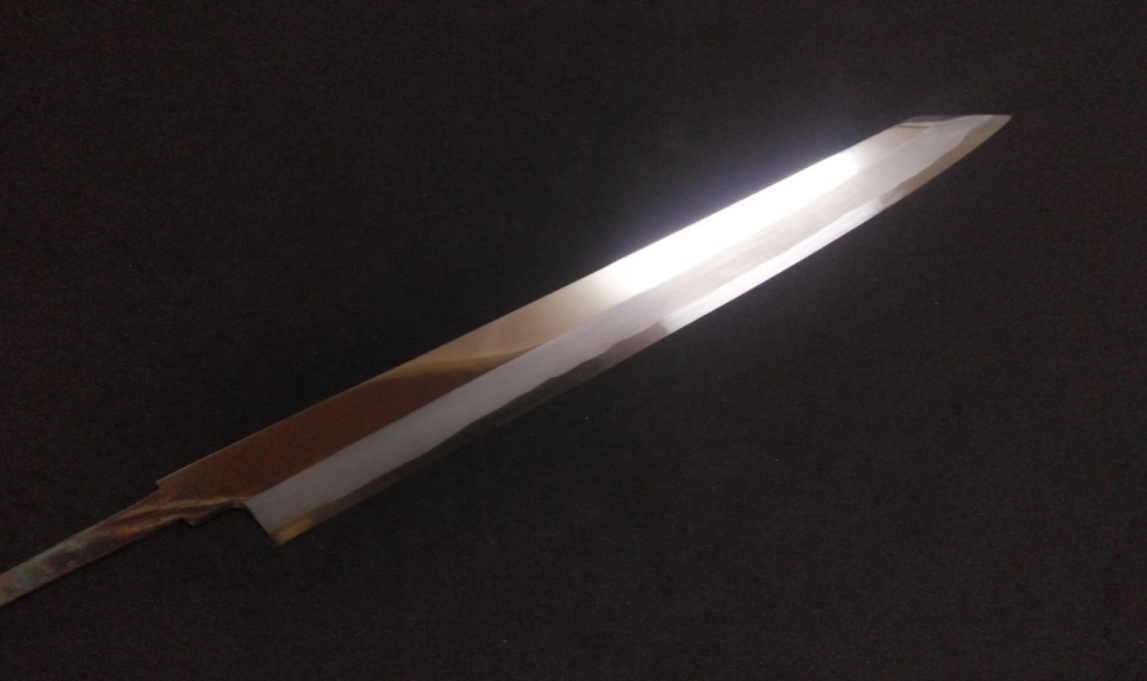
Why Many Product Photos Show Only the Blade
At KIREAJI, every knife is made to order in Sakai, Japan. Photos show the blade before the handle is attached, allowing artisans to perfect the balance and edge for your specific order. Your knife arrives fully finished — tailored just for you.

Global Delivery from Sakai
Across the world, discerning cooks seek authentic Japanese knives from Sakai — Japan’s legendary knife-making city with over 600 years of tradition.
At KIREAJI, we work alongside master artisans in Sakai to fulfill that desire, shipping genuine handcrafted knives directly from the workshop to kitchens worldwide.
Satoshi Nakagawa: Forging the Future of Sakai’s Knife-Making Tradition
-
From Apprentice to Young Master
At just 16, Nakagawa entered the forge of Kenichi Shiraki as his sole apprentice, enduring an environment defined by searing heat, relentless hammering, and uncompromising standards. Over 16 years, he absorbed not only the technical mastery of forging but also the belief that “knife-making is breathing life into steel.”
-
The Art of Forging
To Nakagawa, forging is a dialogue with the steel—listening to its responses, adapting to its subtle changes, and shaping it to reveal its fullest potential. His knives deliver sharpness, durability, and beauty, achieving a seamless connection between tool and user.
-

-
Balancing Tradition and Innovation
While grounded in Sakai’s 600-year knife-making heritage, Nakagawa continues to push the boundaries of the craft with original blade patterns such as Enmon Bokuryu and Genbu Bokuryu, advanced hardening techniques like Mizumoto-yaki, and mastery over a diverse range of steels.
-
Recognition and Responsibility
In 2023, at the age of 30, Nakagawa became the youngest Traditional Craftsman in Sakai’s history. His blades are treasured by elite chefs around the world, admired for their precision, efficiency of production, and exceptional real-world performance. Yet he remains humble, always acknowledging that every finished knife is the result of many skilled hands across Sakai’s division-of-labor tradition.
-

Vision for the Future
For Nakagawa, tradition is not something to preserve unchanged—it must evolve. He is committed to mentoring future generations, experimenting with new materials, and sharing the excellence of Japanese craftsmanship with the world. Through his work, the story of Sakai’s forged blades is not merely maintained—it is being written anew.
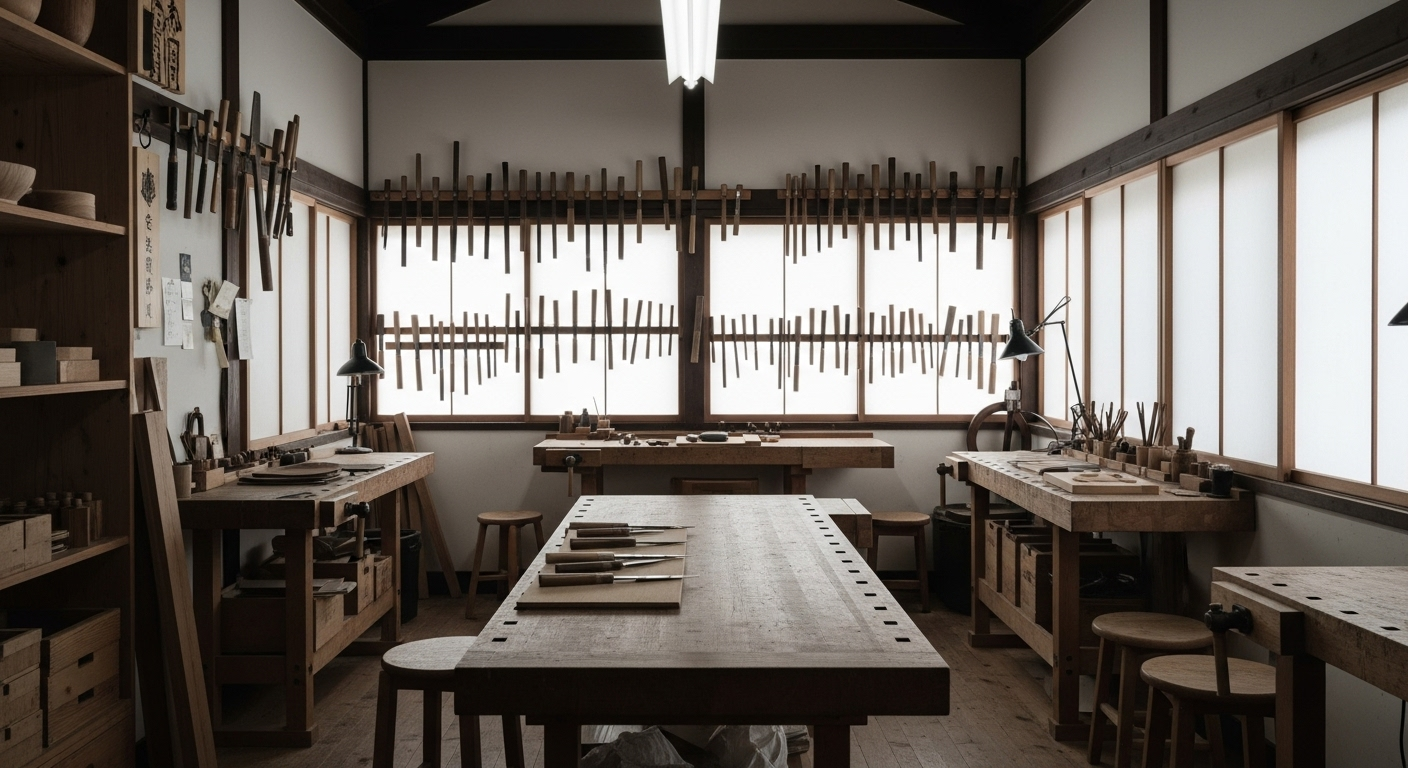

The Master Craftsmen of Sakai Uchihamono
In Sakai, centuries-old techniques are carried forward by government-certified Traditional Craftsmen. Each knife is not just a tool but a living symbol of tradition, precision, and spirit—kept alive through their hands.
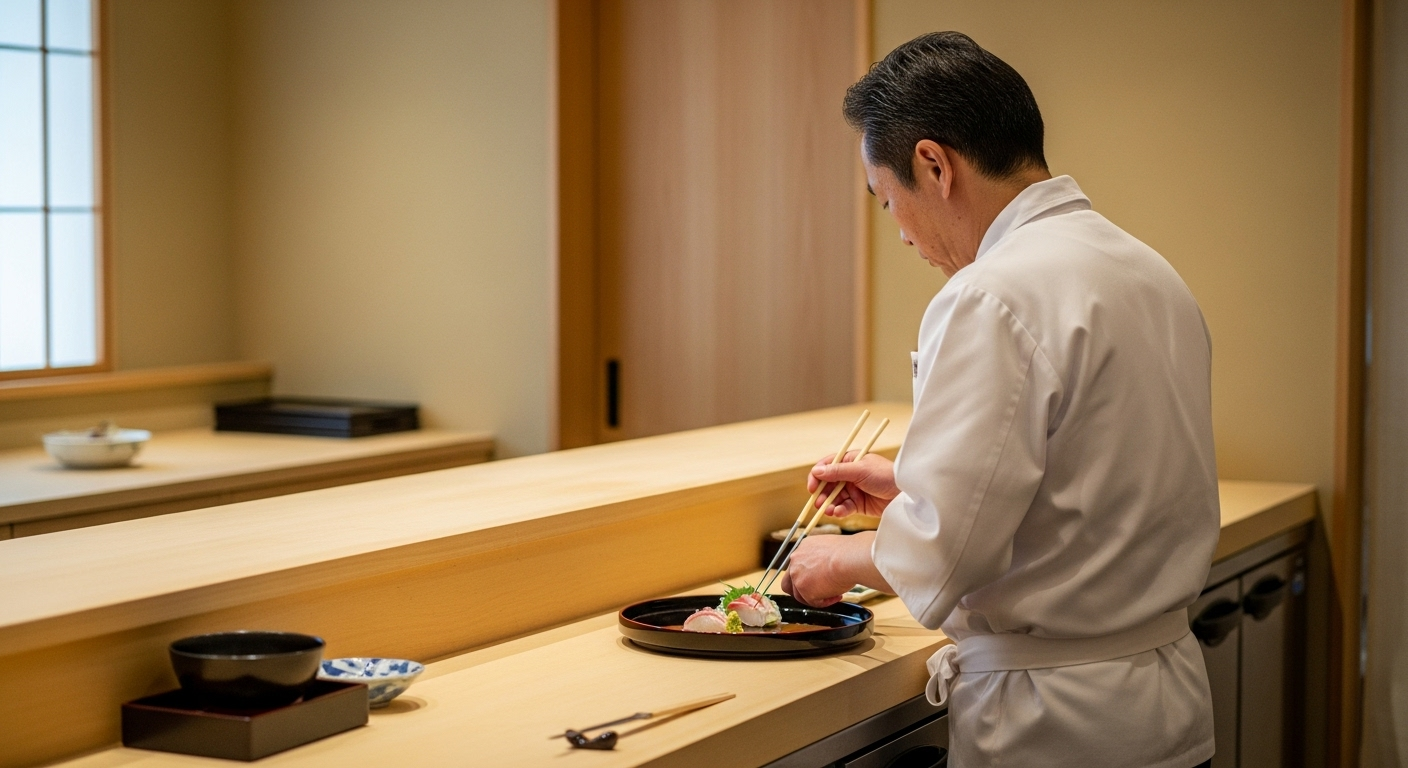
Why Do 98% of Japan’s Chefs Trust Sakai Knives?
For over 600 years, Sakai has perfected a unique craft where each stage—forge, sharpen, finish—is mastered by specialists. This tradition makes Sakai the birthplace of Japan’s most trusted knives.
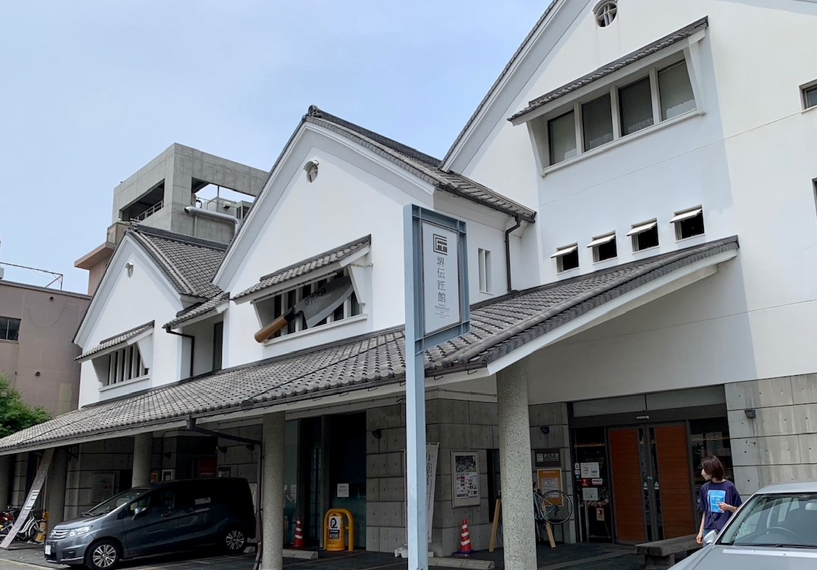
The 98% Statistic: More Than a Number
According to the Sakai Tourism Bureau, “98% of Japanese chefs use Sakai knives.” This figure isn’t just a claim—it reflects the deep trust chefs place in Sakai’s centuries-old craftsmanship.

Sakai’s Dwindling Masters: A Legacy at Risk
Once the heart of Japan’s finest cutlery, Sakai now has only a handful of blacksmiths left. With rising competition and fading interest among the young, new markets and fresh apprentices are vital to survival. Supporting these craftsmen means safeguarding a 600-year cultural legacy.

Kenichi Shiraki
Kenichi Shiraki, a master blacksmith and certified traditional craftsman, was renowned for his command of Sakai’s knife-making traditions. His legacy lives on through his sole apprentice, Satoshi Nakagawa, who trained under him for 16 years before founding Nakagawa Cutlery in 2021. Now retired, Shiraki’s knives have become rare treasures, highly sought after by collectors and chefs alike.
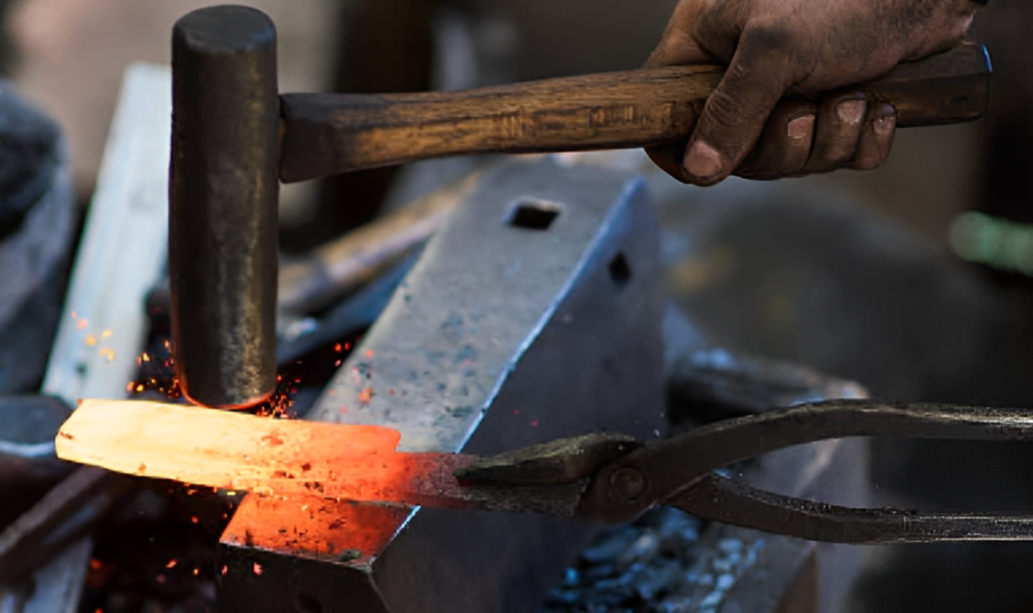
The Soul of Craftsmanship
-
Passing the Flame, Forging the Future — My Life in Steel
In Sakai, the making of a knife is never the work of one person. It is a chain of skills, passed from one set of hands to another, each step requiring absolute precision. My role in this process is forging—shaping raw steel into the soul of a blade.
-
When I strike the hammer, I am not simply hitting metal. I am listening to the voice of steel, adjusting to the fire’s breath, and making decisions in a moment that will decide the life of the knife. I still remember the first time I held steel in the forge. With every blow, it responded. That exhilaration, and the realization of how much I did not yet know, has stayed with me ever since.
-
This path is not easy. The fire burns hot, mistakes are merciless, and mastery takes decades. But I believe that steel is alive—and if you learn to hear it, no challenge is beyond reach. Each day, I face the forge with this belief, pushing myself to grow.
-
Visitors sometimes come to my workshop. When they see the sparks, the heat, the steel glowing red, they often fall silent in awe. In those moments, I feel the weight of my responsibility—not only to make knives, but to carry forward the spirit of Sakai into the future.
-
Every knife I forge carries a piece of my spirit. My hope is that these blades will not only serve chefs in their work, but also inspire the next generation to take up the hammer, to feel the same thrill I once felt, and to create something greater still.
-
The flame of Sakai has burned for over six centuries. It is my duty—and my passion—to ensure it burns brighter for those who come after me.
How Japanese Knives Are Made: The Sakai Tradition
VIDEO PROVIDED: JAPAN TRADITIONAL CRAFTS AOYAMA SQUARE (YOUTUBE)
-
Sakai Forged Blades — Six Centuries of Unrivaled Craftsmanship
Loved by chefs around the world and trusted by 98% of Japan’s top culinary professionals, Sakai knives are more than tools—they are the living legacy of over 600 years of master craftsmanship.
-
At KIREAJI, we work directly with the Shiroyama Knife Workshop in Sakai, Japan, ensuring every blade is hand-forged, finished to perfection, and shipped straight from the workshop to kitchens across the globe. No middlemen. No mass production. Only authentic, artisan-made knives, crafted to elevate your cooking for a lifetime.


